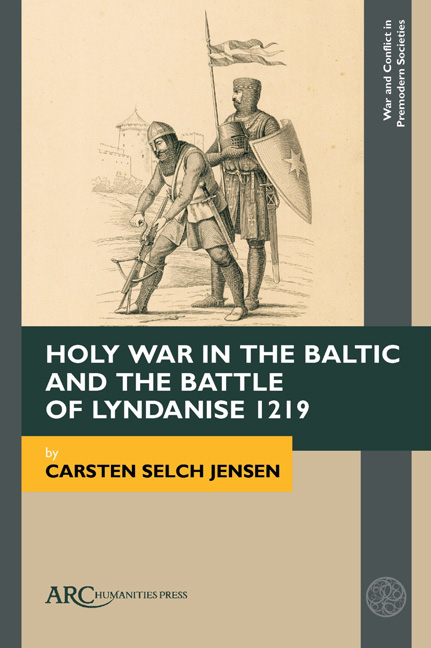Book contents
- Frontmatter
- Contents
- List of Illustrations
- Acknowledgments
- Introduction. Holy War in the Baltic and the Battle of Lyndanise 1219
- Chapter 1 Foreign Shores—Foreign People: The Medieval Baltic and its People
- Chapter 2 Fighting God’s War: Papal Crusading Politics in the Baltic from the Early 1100s until the Early 1200s
- Chapter 3 A Society Organized for War: Denmark at the Beginning of the Thirteenth Century
- Chapter 4 Competing Powers: The German Mission in Livonia and the Initial Quest for Estonia
- Chapter 5 Waging War in the Wilderness: Western Military Traditions Meet Baltic Traditions
- Chapter 6 The Danish Expedition to Estonia in 1219 and the Battle of Lyndanise
- Chapter 7 Conquering Hearts and Minds: The Aftermath of the Battle
- Conclusion A Penny in the Box: How Estonia Came to Save Denmark
- Select Bibliography
- Index
Chapter 2 - Fighting God’s War: Papal Crusading Politics in the Baltic from the Early 1100s until the Early 1200s
Published online by Cambridge University Press: 08 May 2024
- Frontmatter
- Contents
- List of Illustrations
- Acknowledgments
- Introduction. Holy War in the Baltic and the Battle of Lyndanise 1219
- Chapter 1 Foreign Shores—Foreign People: The Medieval Baltic and its People
- Chapter 2 Fighting God’s War: Papal Crusading Politics in the Baltic from the Early 1100s until the Early 1200s
- Chapter 3 A Society Organized for War: Denmark at the Beginning of the Thirteenth Century
- Chapter 4 Competing Powers: The German Mission in Livonia and the Initial Quest for Estonia
- Chapter 5 Waging War in the Wilderness: Western Military Traditions Meet Baltic Traditions
- Chapter 6 The Danish Expedition to Estonia in 1219 and the Battle of Lyndanise
- Chapter 7 Conquering Hearts and Minds: The Aftermath of the Battle
- Conclusion A Penny in the Box: How Estonia Came to Save Denmark
- Select Bibliography
- Index
Summary
CRUSADING BECAME A reality in the Baltic in the context of the wide-scale and papal initiated preaching campaigns that followed in the wake of the fall of Edessa in 1144. But even before that point, some sources suggest that some of the earlier military campaigns in the region, in fact, may have been inspired by the wider crusading move-ment that had taken root in Europe shortly before 1100 and which eventually came to influence all societies within Western Christendom.1 The military conquest of Livonia and Estonia, therefore, needs to be viewed within the overall framework of holy war and crusading ideo logy, taking into account both the general papal crusading politics of the time and the specific papal involvement in the Baltic Sea region during the twelfth and thirteenth centuries.
The particular aim of the preaching campaigns following the fall of Edessa was to recruit crusaders to what would become known as the Second Crusade (1145–1149); the goal being to reconquer what had been lost and to help the hard-pressed Chris-tians in the Holy Land.2 The loss of Edessa sent shockwaves throughout Europe and led directly to Pope Eugenius III (r. 1145–1153) promulgating the crusading bull Quan-tum praedecessores. The bull exhorted the princes of Christendom to take the cross and come to the aid of their fellow Christians in the Holy Land. Pope Eugenius was wholly dependent on the many preachers who travelled around on his behalf announcing what happened in Edessa, while exhorting their audiences to answer the pope's call to take the cross and go on crusade to the Holy Land.3 A papal legate also travelled to Denmark to persuade the Danes to take part in the planned crusade to reconquer the lost ter-ritories.
One of the most prominent of these crusade preachers was the Cistercian abbot Ber-nard of Clairvaux (1090–1153). Pope Eugenius had appointed him as his special envoy in recognition of his considerable oratorical skills. Bernard's work took him all round France, where he had great success preaching to the king of France and his leading bar-ons at Easter 1146.
- Type
- Chapter
- Information
- Holy War in the Baltic and the Battle of Lyndanise 1219 , pp. 17 - 42Publisher: Amsterdam University PressPrint publication year: 2024



